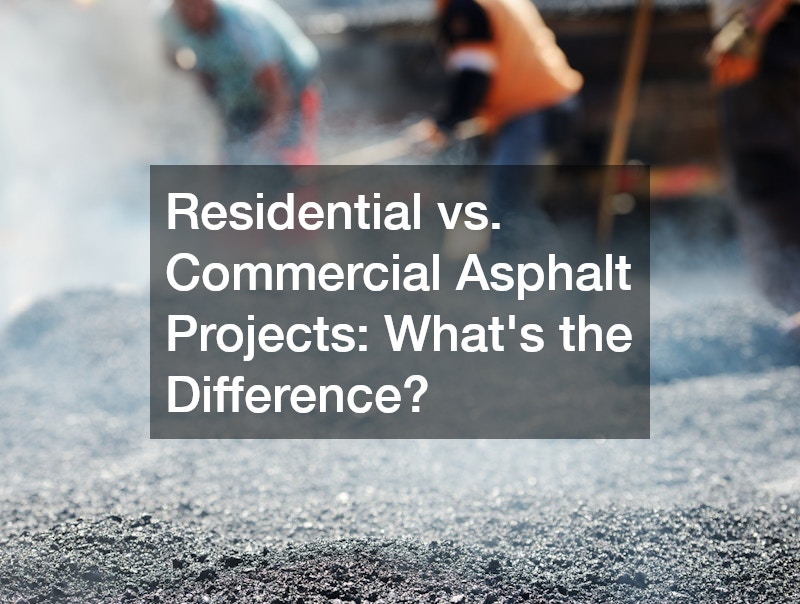Understanding the nuances between residential and commercial asphalt projects is crucial for ensuring the success and durability of your paving endeavor. Whether you’re reinforcing a home driveway or managing the infrastructure of an expansive commercial property, each comes with its own set of requirements, costs, and considerations. This article delves into the essential distinctions and offers insights into choosing the right approach when working with your asphalt contractor.
Key Differences in Design and Planning
Project Scope and Usage Requirements
Residential asphalt projects typically involve smaller areas such as driveways or private pathways, leading to simpler designs and less intensive planning. In contrast, commercial projects must account for larger spaces like parking lots or access roads, necessitating substantial usage and traffic considerations.
The increased complexity in commercial projects requires careful attention to engineering specifications to handle higher weight capacities and more frequent usage.
The functional requirements differ greatly between residential and commercial applications, influencing the design and material choices. Residential projects prioritize aesthetic appeal and basic durability, whereas commercial projects must withstand constant wear and exposure to varied weather conditions. Consequently, the scope for commercial projects demands robust design strategies to prevent premature deterioration.
Regulatory and Zoning Considerations
Both residential and commercial asphalt projects must adhere to specific regulatory and zoning guidelines, impacting potential design options. Residential zones generally have fewer restrictions but still need compliance with certain codes to maintain uniformity in neighborhoods. On the other hand, commercial sites often face stringent zoning laws that dictate the maximum area for paving, environmental impact concerns, and drainage needs.
Failure to comply with regulations can result in costly fines or project delays, making awareness of these rules crucial. In commercial projects, it’s particularly important to understand the environmental and infrastructural legalities, ensuring projects are completed within the legal framework. Zoning laws can also dictate necessary features like fire lanes or disabled-friendly access, adding layers of complexity not typically seen in residential settings.
How Costs Compare Between Residential and Commercial Projects
Budgeting and Cost Factors
The cost differences between residential and commercial asphalt projects are primarily due to size, complexity, and utility requirements. Residential projects often involve lower overall material and labor costs, given their smaller scale and straightforward installation processes. Conversely, commercial projects command a larger budget, reflecting the extensive planning, increased materials, and specialized labor necessary for implementation.
In estimating expenses, commercial projects must account for additional costs such as advanced drainage systems, safety signage, and sometimes even custom pavement markings. Large-scale commercial developments might also require traffic management during construction, adding further to labor and logistical expenses. Despite the higher upfront costs, addressing all these elements is imperative for compliance and future functionality.
Long-term Value and Investment
Investing in asphalt projects entails evaluating both initial costs and future potential returns, with commercial projects typically offering a more substantial long-term value. Commercial installations, if maintained well, can significantly enhance the property’s utility and appeal, attracting businesses and thereby increasing rent or resale value. On the flip side, residential asphalt projects, though less costly, add immediate value through improved aesthetics and convenient, durable surfaces.
Long-term considerations, including maintenance schedules and lifespan, are essential for both residential and commercial projects. Regular maintenance keeps both small driveways and large parking lots pristine, yet the associated costs differ in magnitude. For commercial properties, maintenance is not merely about appearance but about extending usability, thus safeguarding initial investments.
The Installation Challenges and Techniques
Site Preparation and Installation Process
Site preparation is a critical phase in both residential and commercial asphalt projects, with commercial sites typically undergoing more rigorous preparation. For residential areas, preparation includes clearing, grading, and ensuring proper drainage to avoid water pooling issues. Commercial sites require additional attention, with intricate drainage systems, soil stabilization, and structural support due to larger coverage and heavier expected loads.
The installation process also varies significantly, with commercial projects often utilizing advanced paving machinery and techniques to expedite completion and enhance durability. Larger teams and coordinated logistics are necessary to cover vast areas efficiently, often necessitating phased construction to minimize disruption. Conversely, residential projects may proceed with smaller teams and often focus on achieving a balance between speed and meticulous craftsmanship.
Weather and Environmental Impact
Climate and environmental considerations play crucial roles in both residential and commercial asphalt projects. Residential projects are more immediately affected by seasonal weather changes that might constrain installation periods to avoid freezing or excessively wet conditions. In commercial contexts, the environmental impact is scrutinized more rigorously, requiring strategies that address heat absorption, stormwater management, and eco-friendly practices.
Installation challenges associated with extreme weather conditions necessitate flexible scheduling and adaptations in material choice for both project types. For instance, commercial projects may require heat-resistant materials to counteract expansive parking lot temperatures. Meanwhile, residential sites may need fast-setting products to ensure timely completion without sacrificing quality during unpredicted weather shifts.
While both residential and commercial asphalt projects share similarities, the differences are significant enough to require careful consideration. Understanding these distinctions helps property owners make informed decisions that optimize their investment, functionality, and aesthetic appeal. Choosing the right team with expertise tailored to the specific project type is crucial for achieving a successful outcome.




